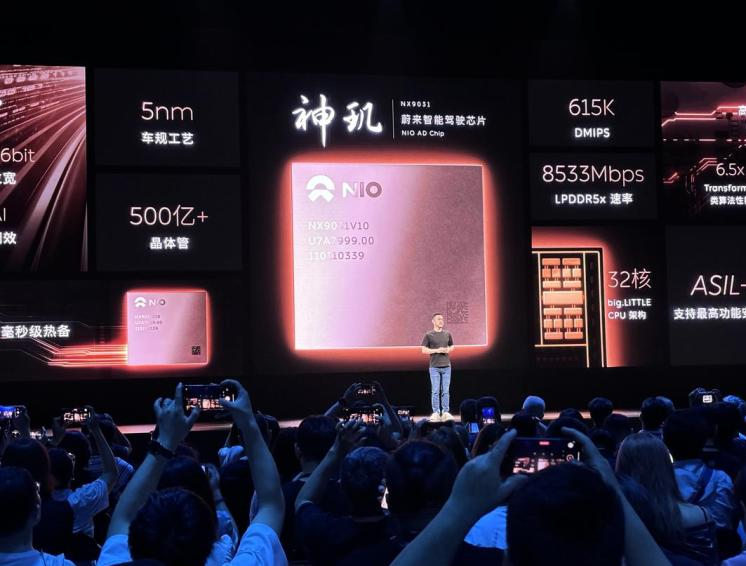
"You can see that in the dark light environment, the performance of this chip is really not a general lead, these four words I did not say -" Li Bin, the founder of the Chinese electric vehicle brand Nio, just fell, the audience quickly responded: "far ahead!"
At the "2024 NIO Innovation and Technology Day" held in Shanghai on Saturday (July 27), Li Bin announced to hundreds of spectators and hundreds of Chinese media that NIO's self-developed world's first car size 5-nanometer intelligent driving chip "Shenguet NX9031" was successful.
Automotive Grade chips are chips used in automobiles that have higher safety and reliability requirements than consumer grade chips. The success of the film means that the next step can begin mass production.
Against the backdrop of the US technology blockade on Chinese advanced process chips, this is another Chinese technology company claiming progress in the chip field after Chinese telecommunications equipment giant Huawei produced a 7-nanometer chip last year.
However, unlike Huawei's low-key launch of the mobile phone Mate 60 Pro with domestic chips a year ago, NIO this time announced a breakthrough in the 5-nanometer process. According to the NIO announcement, NX9031 has more than 50 billion transistors, in terms of comprehensive capability and execution efficiency, one can achieve the performance of four industry flagship chips.
China's automotive chip localization rate is only 10%
China's new energy vehicle sales have now accounted for 60% of the global market, and BYD has surpassed Tesla to become the global sales champion of pure electric vehicles. China's electric cars are all the way to the frontier, without the thousands of vehicle scale chips in each car.
According to the China Association of Automobile Manufacturers, each traditional fuel vehicle requires 600 to 700 chips, electric vehicles require 1,600 chips, and more advanced smart cars can reach 3,000 chips.
However, China still mainly relies on imports of automotive chips. Xu Man, deputy secretary-general of the China Electric Vehicle 100, said at the 2023 Global New Energy and intelligent vehicle supply chain Innovation Conference that China's automotive chip localization rate has increased to 10%, but compared with Europe, the United States and Japan and other auto powers, the short board is still very obvious.
In order to solve the problem of "stuck neck" of automotive chips, China's Ministry of Industry and Information Technology issued the "National Automotive chip Standard System Construction Guide" in January this year, clearly formulating the number of years and indicators of automotive chip standards.
In March, Bloomberg reported, citing people familiar with the matter, that Chinese authorities have asked electric car makers such as BYD and Geely to significantly increase the use of locally made car chips, raising the localization rate to 20% by 2025.
With policy encouragement, China's automotive chip development companies have blossomed throughout the past few years, from dozens in 2020 to more than 300 last year. Byd, NiO, Ideal, Xiaopeng and other car companies have also announced their own research and development chips.
Analysis: The necessity of intelligent driving high computing power chip remains to be seen
Chen Ziang, a senior semiconductor industry consultant, said in an interview with Lianhe Zaobao that if only in domestic comparison, NIO chips have reached a step in the process and the number of transistors, but there is still a gap between the world's most advanced chips.
Chipmakers Samsung and TSMC have started mass production of 3-nanometer chips in 2022, and TSMC plans to start mass production of 2-nanometer chips next year. In terms of automotive chips, Samsung partnered with Tesla in 2021 to produce chips for autopilot and Hyundai Motor last year.
Chen Ziang pointed out that electric vehicle manufacturers, including Tesla and Hyundai, have not launched 5-nanometer chips, which is not technically impossible, but high computing power chips are currently "not necessary" for electric vehicles. He said consumers are more concerned about whether the car is safe than how smart the operating system is.
Gu Wenjun, chief analyst of semiconductor research institute Xinmo Research, believes that in the process of automatic driving, a large amount of data needs to be calculated, so the use of 5-nanometer process chips is necessary.
When asked by Lianhe Zaobao, Nio said that the automotive industry's research and development and verification cycle is long, intelligent iteration is fast, and the current chip design can be more convenient when doing intelligent driving upgrades in a long cycle, and the redundancy of computing power can also maintain the "top domain control" in the next five years.
Nio released NX9031 chip on the day and when asked by this newspaper, did not disclose the yield information. Chen said that the yield is usually announced when the chip is released, because it is a metric that consumers care about.
Yield refers to the ratio of the total number of chips actually produced to the maximum number of chips on the wafer. TSMC's mature 5-nanometer process has a yield of more than 95 percent, while SMIC's 7-nanometer chip made for Huawei using multiple exposures has reported a yield of less than 50 percent.
Gu Wenjun believes that NIO and Huawei's chips are used in intelligent driving and communications, respectively, and the two are not comparable. However, he pointed out that the production volume of self-developed automotive chips is usually relatively small, which may not be cost-effective from the economic point of view, "it depends on the next plan of NIO."

A new survey released in the United States shows that in the context of rising prices and growing concerns among the public about the economic outlook of the country, there is a coexistence of frugality and differentiation.
A new survey released in the United States shows that in th…
By the end of 2025, the situation in the Middle East resemb…
According to Channel NewsAsia, international oil prices hav…
On Sunday, US President Donald Trump Trump met with Ukraini…
Officials in the Trump administration, speaking on Fox News…
In 2025, the Trump administration reshaped the global trade…